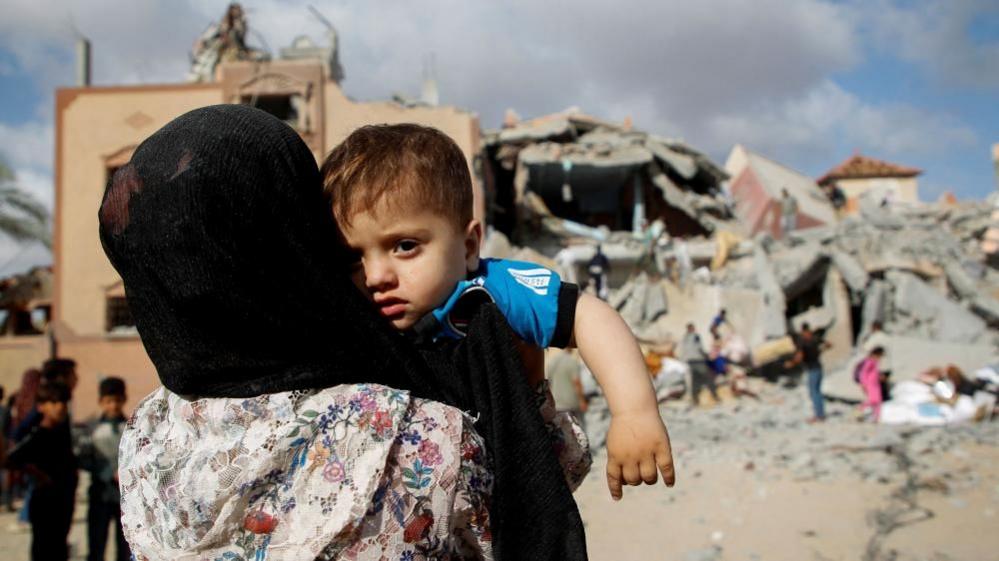Israel tells Gaza ceasefire negotiators to resume work

There has been no progress towards a ceasefire since Biden's announcement five weeks ago
- Published
Israeli Prime Minister Benjamin Netanyahu has decided to send a team of negotiators to discuss a hostage release deal with Hamas.
US President Joe Biden welcomed the development, which comes a day after Hamas responded to a Gaza ceasefire plan he outlined in late May. The last indirect talks took place in Cairo earlier that month.
Details of Hamas's latest response have not been made public, but a Palestinian official told the BBC that the group was no longer demanding a full ceasefire at the outset of the plan presented by Mr Biden.
A senior US administration official said Hamas had agreed to "pretty significant adjustments" to its position.
"We've had a breakthrough on a critical impasse," the US official said, although he stressed that "this does not mean this deal is going to be closed in the period of days".
President Biden and Prime Minister Netanyahu held a phone call on Thursday, which focused on the hostages and ceasefire negotiations, the official said.
On Wednesday, Hamas's political leadership said it had contacted mediators from Egypt and Qatar about ideas it had been discussing with the aim of reaching an agreement.
Up to now Hamas has demanded an end to the war and a full withdrawal of Israeli troops from Gaza. Israel says it will accept only temporary pauses in the fighting, until it eliminates Hamas.
When he announced the plan on 31 May, President Biden said it was based on a more detailed Israeli proposal, and that it involved three phases.
The first would include a "full and complete ceasefire" lasting six weeks, the withdrawal of Israeli forces from populated areas of Gaza, and the exchange of some of the hostages - including women, the elderly and the sick or wounded - for Palestinian prisoners held in Israel.
The second phase would involve the release of all other living hostages and a "permanent end to hostilities". The third phase the start of a major reconstruction plan for Gaza and the return of dead hostages' remains.
After the two leaders' phone call on Thursday, the Israeli government said in a statement: "Prime Minister Netanyahu updated President Biden on his decision to send a delegation to continue the hostage negotiations and reiterated the principles that Israel is committed to, especially its commitment to end the war only after all of its goals have been achieved."
Mr Netanyahu has declared his objectives to be the return of all remaining hostages, the destruction of Hamas's military and governing capabilities, and ensuring Gaza no longer constitutes a threat to Israel.
The White House said Mr Biden "welcomed the prime minister's decision to authorise his negotiators to engage with US, Qatari, and Egyptian mediators in an effort to close out the deal".
A source in the Israeli negotiating team meanwhile told Reuters news agency that Hamas's response included "a very significant breakthrough" and that there was "a deal with a real chance of implementation".
A senior Palestinian official told the BBC earlier on Thursday that Hamas had given up the demand for a complete ceasefire. Its new conditions, the official said, related to the withdrawal of Israeli forces from a strip of land running along Gaza's southern border with Egypt, known as the Philadelphi corridor, and from the Rafah crossing between Gaza and Egypt.
The source, who was informed of the response Hamas submitted to the mediators, added that the atmosphere was positive. "We are going to a new round of negotiations soon,” the source said.
The US has accused Hamas of blocking progress towards a ceasefire.
On Monday, US Secretary of State Antony Blinken said the group was the “one exception” to international support for the ceasefire proposal. Hamas, he said, had created "gaps... in not saying yes to a proposal that everyone, including the Israelis, had said yes to”.
Prime Minister Netanyahu has said he is “committed to the Israeli proposal welcomed by President Biden”, although he has not publicly endorsed the outline as it was laid out.
The war was triggered by Hamas's unprecedented attack on Israel on 7 October in which Hamas-led gunmen killed about 1,200 people and took 251 others back to Gaza as hostages.
At least 38,010 Palestinians have been killed in Gaza as a result of Israel's offensive, according to the territory's Hamas-run health ministry.
Hamas and allied armed groups are believed to still be holding 116 hostages who were taken on 7 October. At least 42 are presumed by Israeli authorities to be dead.
The others have been released, rescued or their bodies recovered.
Four other Israelis have been held hostage since 2014 and 2015, two of whom are presumed dead.
Additional reporting by Rushdi Aboualouf in Istanbul